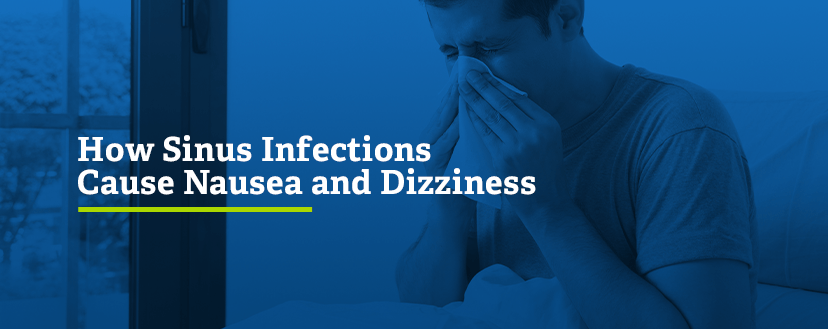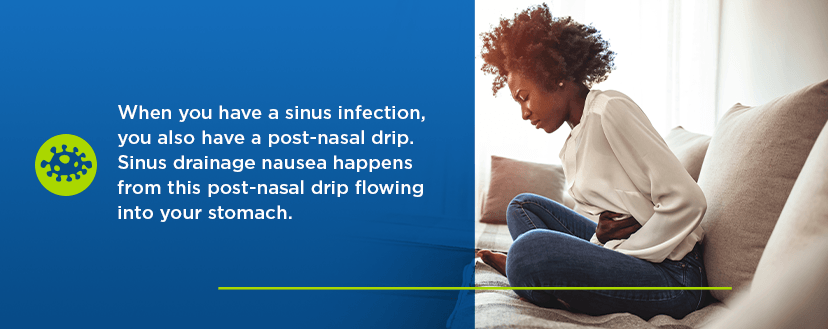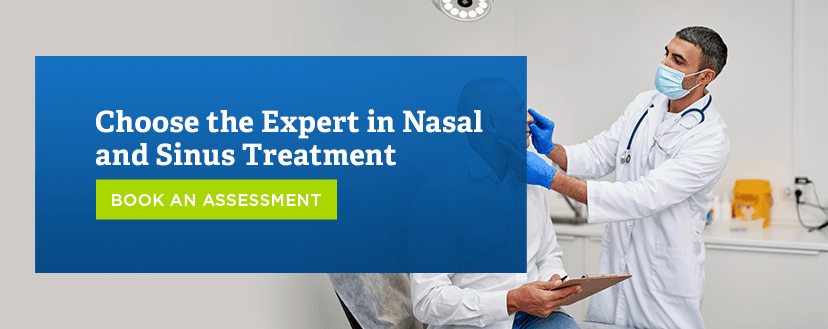
If you’ve felt acute pain and pressure behind your cheeks and forehead, chances are you’ve had a sinus infection. You might have also experienced other symptoms that didn’t seem related to your sinuses, such as dizziness or nausea. Are those symptoms linked? Read on to find out more about your sinuses, what can cause an infection and what symptoms to look for.
Table of Contents
- What Are Your Sinuses?
- Symptoms of a Sinus Infection
- Causes of Sinus Infection Vertigo or Dizziness
- Causes of Sinus Infection Nausea
- What to Do if You’re Experiencing Severe Nausea and Dizziness
- Choose the Expert in Nasal and Sinus Treatment
What Are Your Sinuses?
Behind the bones of your face are four pairs of air cavities — your sinuses. Their primary role is to produce mucus that moisturizes the nasal passage and to ward off pollutants and microorganisms. Because they’re usually filled with air, sinuses also help to lighten the weight of your skull.
When the sinus tissue becomes irritated or inflamed, the cavities can fill with fluid and blockages can result. Colds, allergies or physical conditions such as polyps or a deviated septum can all create blockages. Sinusitis occurs when the blocked fluid becomes infected as a result of fungal, viral or bacterial colonization.
Symptoms of a Sinus Infection
The following symptoms can accompany a sinus infection:
- Fatigue
- Bad breath
- Facial pain and tenderness
- Dental pain
- Headaches
- Nighttime coughing
- Dizziness
- Nausea
Causes of Sinus Infection Vertigo or Dizziness
As listed above, some people may experience vertigo or dizziness with a sinus infection. Vertigo describes a severe type of dizziness that feels like your body spins or moves while standing still. This separates it from lightheadedness, which makes you feel faint. Lightheadedness goes away shortly after lying down. However, dizziness or vertigo persists even after you recline. Discover how your sinus problem could cause this issue and what you need to do about it.
How Sinus Infections Can Lead to Dizziness
Sinus infections happen when your sinus passages have inflammation and congestion. These factors contribute to pressure and sinus headaches. This inflammation or blockage may also affect your ears, resulting in dizziness from pressure or an infection.
Sinus problems may also contribute to ear infections that could cause dizziness or lightheadedness. For instance, middle ear infections may result from allergies or blockage of the Eustachian tubes, which can also cause sinusitis. Middle ear infections may cause a discharge from your ears in some cases.
If your sinus issues affect your inner ears, you could experience labyrinthitis. In addition to dizziness, you may also experience nausea and vomiting from this condition.
How to Treat Sinus-Infection-Related Dizziness
To treat lightheadedness, get as much rest as you can because the light feeling in your head should pass when you lie down. For dizziness, you will need to treat your sinus problems.
When treating sinus or ear problems that cause dizziness at home, never use ear candling to remove wax from the ears. These products are so dangerous that the Food and Drug Administration (FDA) issued a warning in 2010 against their use. The organization noted that this method poses a risk for burns and does not have any scientific evidence to support its use to remove ear wax or help ear infections.
If you have allergies that contribute to your sinus problems, take antihistamines to reduce the allergic reaction and mucus buildup in your sinuses. Next, try decongestants to reduce inflammation and congestion in your sinus passages. While decongestants can ease sinus pressure and subsequent dizziness, do not take them for an extended time without consulting with your doctor. Nasal decongestant sprays can have a rebound effect and cause worse congestion if used for several days in a row.
If you continue to feel dizziness or lightheadedness after treating your problem at home, call a doctor to see if you need a prescription or an alternative treatment to help your sinus or ear problems.
Causes of Sinus Infection Nausea
Sinusitis can lead to nausea in some people. Learn about how nasal congestion can cause that queasy feeling in your stomach and what to do about it.

How Sinus Infections Lead to Nausea
When you have a sinus infection, you also have a post-nasal drip. Sinus drainage nausea happens from this post-nasal drip flowing into your stomach. Nausea can be worse when you have an empty stomach. Unfortunately, post-nasal drip often worsens at times when you have an empty stomach, like in the middle of the night and early morning.
As noted, sinus infections can cause dizziness from ear infections or pressure. This feeling of movement and being off-balance could also make you feel nausea. In fact, another symptom of labyrinthitis, which also causes dizziness, is nausea. Treating the sinus problem will alleviate both dizziness and nausea.
To avoid nausea caused by post-nasal drip, you can gently blow your nose to get some congestion out of your nasal passages. You may also try a sinus rinse with a neti pot.
Use caution when rinsing with neti pots. While the Food and Drug Administration (FDA) notes that sinus rinse products are safe when used and cleaned properly, some people make mistakes during use. If using untreated tap water, you risk a parasitic infection. Follow these recommendations from the Centers for Disease Control (CDC) for treating water to use in a neti pot:
- Purchase distilled water from the store for the safest option.
- Boil tap water for one minute, or three minutes at higher elevations, and let it cool before adding to the neti pot as an alternative to distilled water.
- Filter water through an NSF 53 or NSF 58 filter only if you cannot boil water or obtain distilled water.
- Disinfect water with bleach only if you cannot use distilled, boiled or filtered water. Do not drink this treated water. If the water is clear, use five drops of bleach per quart of water if the bleach has a concentration of 4% to 5.9%. For bleach with 6% to 8.25% concentration, reduce the amount to four drops per quart of clear water. Double the bleach used if treating cloudy water.
How to Treat Sinus-Infection-Related Nausea
While preventing sinus drainage nausea can help, if you already have this symptom, you do have options for easing the discomfort at home:
- Get as much rest as you can to allow your body to fight the sinus infection.
- Try crackers, dry toast or other bland food if your stomach is empty and you feel nauseous.
- Drink plenty of fluids to thin mucus and prevent dehydration.
- Enjoy noncaffeinated, hot herbal teas for soothing heat to unclog sinuses, ease sinus pressure and help mucus flow out of the nose instead of down into your stomach.
While the above methods can ease your nausea symptoms, you should still talk to a doctor about treating your sinus infection. Getting relief from nasal congestion and post-nasal drip will cure your nausea more effectively than temporary home remedies.
What to Do if You’re Experiencing Severe Nausea and Dizziness
Sinus infections can become chronic sinusitis. If you have sinusitis for fewer than four weeks, doctors consider it an acute condition. However, if the problem persists for more than 12 weeks, you have chronic sinusitis. You may also have recurrent sinusitis, which is a sinus infection that happens multiple times throughout the year. While acute cases may resolve themselves, you may need medical assessment and care if you experience any of the following:
- Severe nausea
- Severe dizziness
- Sinus infection symptoms for more than 12 weeks
- Multiple sinus infections in a year
- A fever that lasts for more than a week
A doctor can help treat the sinus infection causing severe dizziness or nausea. Additionally, a physician can prescribe stronger medications for these conditions than you can get over the counter. To get relief from your persistent or severe symptoms, either book an assessment or request an appointment for a telehealth visit.
Choose the Expert in Nasal and Sinus Treatment
Dr. Nguyen is a national expert in the treatment of nasal conditions, responsible for perfecting innovative and effective treatments like balloon sinuplasty. At Houston Sinus and Allergy, we utilize the newest technology and our extensive experience to find the best solution for the health of your nose and sinuses.
You can reach us by calling (832) 237-7777, or fill out the form at the top of the page to book an assessment to start feeling better!
Share Tweet Email Even the name sounds intimidating—brain abscess. It can be an extremely serious condition and one that requires immediate medical treatment. But what, exactly, is a brain abscess and how does one develop? By learning a bit more about the causes, symptoms and treatments of a brain abscess, you can be aware of […]
Share Tweet Email It can be debilitating pain—that pressure in the sinuses that makes your eyes, cheeks and forehead hurt and be sensitive to even a light touch. It has us reaching for pain relievers. But if you’re pregnant, you need to be careful about medication. So how can you relieve that pressure and start […]

